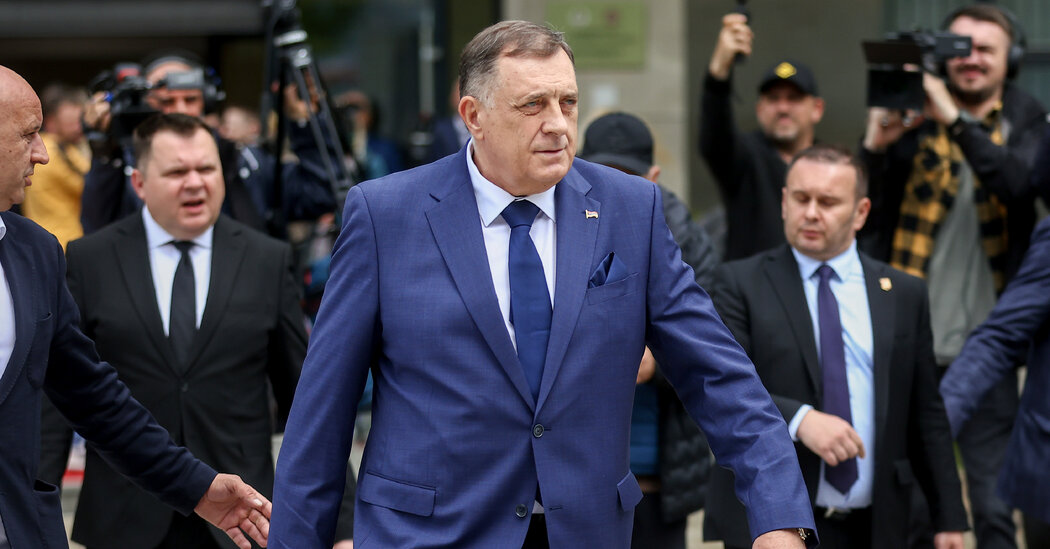The Trump administration on Wednesday lifted sanctions against a Serbian nationalist leader who had been accused of undermining a U.S.-brokered peace agreement that ended bloody sectarian fighting in the 1990s in the Balkans.
The sanctions relief for Milorad Dodik, who had served until earlier this month as president of a small self-governing territory in Bosnia and Herzegovina called Republika Srpska, was a victory for the politician and for a pricey influence campaign mounted on his behalf by several allies of President Trump.
The removal of the sanctions could allow Mr. Dodik, who is still the leader of the ruling party in Srpska and has closely allied himself with President Vladimir V. Putin of Russia, to remain influential in the Serb-controlled region even without a formal role in the government.
Sanctions were also lifted against members of Mr. Dodik’s family and inner circle, as well as companies associated with them, some of which had previously been accused by the Treasury Department of being part of Mr. Dodik’s “corrupt patronage network.”
The Treasury Department did not provide an explanation for the sanctions relief in its announcement, and a spokesman declined to comment.
The State Department suggested in a statement that the sanctions relief was related to these moves, saying that they “will enable a partnership with the United States based on mutual interests, economic potential and shared prosperity.”
In a post on social media, Mr. Dodik praised Mr. Trump and his associates for correcting “an injustice perpetrated by the Obama and Biden administrations.”
In recent weeks, top Trump administration diplomats had met with Mr. Dodik’s allies, while the State Department had praised the Srpska government for appointing an interim president and stepping away from measures flouting the peace agreement.
At least some of the meetings and communications with the Trump administration were facilitated by well-connected lobbyists and lawyers with ties to Mr. Trump who were paid a total of about $300,000 per month or more by the Srpska government, according to filings with the Justice Department.
One of the lobbyists, Marc Zell, signed a contract with the Srpska government late last year calling for his firm to be paid $1 million for one year, with an additional “success fee” for “bringing about the cancellation/termination of all sanctions.”
Mr. Zell did not immediately respond to a request for comment.
Also taking up Mr. Dodik’s cause were several prominent figures in Mr. Trump’s orbit. They included Rudolph W. Giuliani, the former New York City mayor who served as the president’s personal lawyer during his first term; Michael T. Flynn, the retired lieutenant general who briefly served as national security adviser in the first Trump White House; Laura Loomer, the right wing provocateur who has the ear of the president; and Rod Blagojevich, the former governor of Illinois, who was pardoned by Mr. Trump in February before signing a contract with the Srpska government the following month for an undisclosed sum.
They cast Mr. Dodik as a victim of the same sort of political prosecutions that Mr. Trump, Mr. Giuliani, Mr. Flynn and Mr. Blagojevich claim they have faced, and as someone willing to cut lucrative deals with Washington.
Caroline Wren, a lobbyist whose firm Tactic Global signed a $100,000-a-month contract with the Srpska government, said the lifting of the sanctions “sends a clear message to the United Nations and the European Union that the United States will no longer allow unelected bureaucrats to target Christian leaders.”
Ms. Wren, who is close to influential people in the Trump orbit, arranged and attended a meeting in August in Montenegro for Mr. Dodik and a deputy with Richard Grenell, Mr. Trump’s envoy for special missions.
Adnan Cerimagic, an analyst at the European Stability Initiative, a Berlin-based think tank, said that the sanctions relief could be used by Mr. Dodik and his allies to “strengthen their political position.”
And he said that unless Washington clarifies the reasoning behind the sanctions relief, “this will be a signal to others in Bosnia and Herzegovina and beyond that engaging with the new Trump administration, through lobbying, money and individuals close to the administration, can achieve results with the minimal concessions from their side.”
Kenneth P. Vogel is based in Washington and investigates the intersection of money, politics and influence.
The post Sanctions Lifted on a Putin-Backed Autocrat After Lobbying by Trump Allies appeared first on New York Times.




